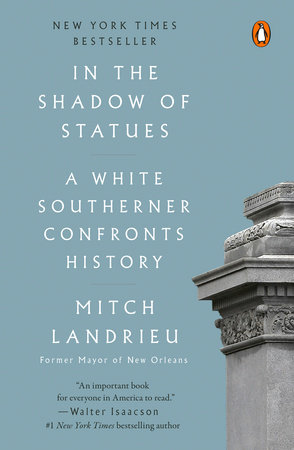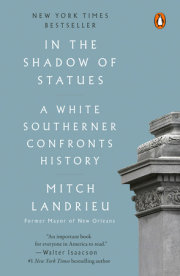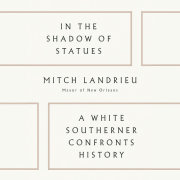Chapter 1 Broadmoor"Your daddy ruined the city."
I was thirteen when the woman yelled those words at me, a newly minted eighth grader at Jesuit High School, where my father had been a star athlete a quarter century before. Earlier that day, Father Harry Tompson, the principal, a jovial man but quite the disciplinarian, summoned me to his office. "There has been a threat made against your life," he said gravely. Someone had called the switchboard with an alarming message. With a wary eye, Father Tompson escorted me across Banks Street to the gym, letting me go in for basketball practice early.
It was 1973, and three years since my father, Moon Landrieu, was inaugurated as mayor of New Orleans. He had spent those years fulfilling campaign promises to give African Americans access to public contracts and jobs in city government, while prodding hotels and restaurants to do more than simply welcome black customers-that is, to hire black people above the level of dishwashers, maids, and bellhops. Segregation practices were eroding after federal court decisions, which angered and frightened many whites, who feared the political power of newly registered African American voters in a city that was still at that point 65 percent white. New Orleans might have been among the crown jewels of the South, but with white flight to the suburbs, the demographics, power structures, and economy were changing quickly. Today the city is 60 percent black.
My father was a pragmatist, and a pro-business New Deal-style Democrat. He was also morally grounded. The credo he stressed to my siblings and me was simple, if profound: "Be honest, and be fair."
Growing up, I was vaguely aware of my dad taking heat over politics, but when he sat down for dinner with us, which he did nearly every night, he didn't mention rabble-rousers who jeered at City Council meetings. We had free-flowing conversations, warm with humor, as he asked about us, our lives, what we did that day. We often had guests in those years, too. But a backlash was building, and about to catch me.
That day at practice, I joked about the death threat as guys came into the locker room; everyone thought it was cool. A few minutes later, one of my friends ran in and said, "There's some lady outside calling your name, cursing you, saying she wants to kill you." We did the only thing that teenage boys would do-go outside and see the threat. From the cement platform above the field-house steps, I recognized her right away, an older woman who had a fiery presence in local politics. I had seen her on TV news in the late sixties, protesting when my father was a councilman-at-large and they took down the Confederate flag in the City Council chambers. She kept on protesting after that. As I stood there, she began yelling profanities. "You got black blood!" she finally snarled. "That explains it all!"
My friends were riveted. She stuck a hand into her purse. Someone yelled, "She has a gun!" They all scattered, leaving me to face what was to come. I had a shaky sense that she wouldn't shoot an unarmed Jesuit prefreshman in cold blood. She pulled out a business card with her name, wrote on it "Your father is a nigger lover," and threw it at me. "He is sending this city to hell!" she shouted. Then she bolted off.
I was in a churn of confusion, but what I felt more than anything was pity. I didn't think that she would hurt me; I could tell that she was challenged, not in full control-that in some awful way she was crippled by her beliefs. That night I told my father what had happened. "She's harmless," he said. I knew he had been dealing with people like her for some time; his optimism and upbeat politics registered on me in a calm, steady way. That encounter at school marked the first time I felt the hater's pain, the frustration and fury spilling out at things beyond her control. I have seen this expression of spirit throughout my life since then. Art and music engage the human heart and transcend time; sadly, so does hatred. I learned this one early.
When I announced in 2015 that we were going to take down four icons of the Confederate past, the front desk at City Hall logged a flood of calls from people burning with anger. The familiar hate was back.
"He's ruining this city, just like his father. He's gonna pay!"
"He better watch out!"
And yet, other voices from the past came back to comfort me.
"Say, baby, how's your daddy? Best mayor we had."
"Hey, young man! Tell your momma hello! Love that woman."
I cannot remember a time when the issue of race was not part of my life or our family's. It's like a song that you cannot get out of your head; it keeps playing over and over. Race is a soundtrack that stays with me. New voices roll in: hostility at one side; a benevolent approval-love, if you will-at the other; and a swirl of voices in the middle range, hashing out what it means to be American, our common identity as citizens. I take heart that many white people have traveled far in their views on race. Many young people embrace diversity as a natural order of things, with no memory of a South governed by segregationists and white supremacists. And yet, today's public square teems with hatred of an intensity we haven't seen since the 1960s. The violence by white nationalists in Charlottesville, Virginia, shows that hatred will grow if we do not shine the light of God's love and human reason on the darkness and chart a path of healing for the country as a whole.
New Orleans mirrors a map of the world, a city where people of many countries have settled, shaping a beloved culture that has been enriched with jazz, Creole and Cajun cuisine, and so much more. We've shared culture across racial lines, but we also have played a seminal role in some of the saddest chapters in American history. More humans were sold into slavery in New Orleans than anywhere else in the country. Hundreds of thousands of souls were sold here, then shipped up the Mississippi River to lives of forced labor, of misery, of rape, of torture. As we entertain visitors from around the world along our beautiful riverfront, it is hard to fathom that at this very spot, ships emptied their human cargo from Senegal, marching their captives down the street to what is now one of our famous hotels, but there are no historical markers on that path. No monuments or flags to the lives destroyed.
New Orleans is where black Creoles launched a legal challenge to segregated public transportation, a case that led to the 1896 Supreme Court decision Plessy v. Ferguson, which enshrined Jim Crow's "separate but equal" into law. In 1892 a mixed-race man named Homer Plessy attempted to board a whites-only train car but was arrested because he was one-eighth black. Sixty years later, Freedom Riders coming to New Orleans were beaten to a bloody pulp. Today, though, even as white identity politics rage, I take comfort that my city understands that diversity is our strength, greeting visitors with warmth and a cultural effervescence, even as we resolve to work hard to evolve and heal. We all have so far to go.
I'm struck by how often people describe others first by the color of their skin-black people, African Americans, people of color. When I think about the people I love and have learned from, I don't think about their color; I remember their words. My family set me on a path, but many others helped guide me.
"The most important thing to remember is that no one can take away from you anything that you learn," Norman Francis told me when I was just a boy. Dr. Francis served forty-seven years as president of Xavier, the historically black Catholic university in New Orleans. He was one of the first two African American students at Loyola University New Orleans law school in the 1950s, where he and my father met and forged their lifelong friendship. Dr. Francis received a Presidential Medal of Freedom from President George W. Bush for his work in rebuilding Xavier after Hurricane Katrina. "The future belongs to those who are educated," Norman often said in his calm, comforting way.
Other voices echoed that woman's on the steps of the Jesuit gym.
"Moon the Coon!" barked a man when I picked up the phone as a kid, long before caller ID. The man hung up. I have no clear memory of my father talking about the hate calls we got; maybe I've blotted it all out, because the more vivid, lasting memory of my adolescence is jumping into the car with my dad on Saturdays as he drove around the city, visiting playgrounds, police stations, fire stations, and city work sites. The city was in his bloodstream, as it is in mine.
Maurice Edwin Landrieu was born in 1930, the younger of two brothers. They grew up on Adams Street, a working-class neighborhood in the Uptown area. The house was twelve feet wide and fifty feet deep and faced a graveyard. Dad slept with his brother, Joe, in the storage room of a storefront grocery run by my grandma, Loretta Landrieu. My grandpa, Joseph Geoffrey Landrieu, had a third-grade education and worked for the public utility company, then called NOPSI, in one of the power stations. I remember him tenderly; Grandpa Landrieu died when I was seven.
The nickname "Moon" was apparently given to Dad from Uncle Joe early on, that's all we know. Everyone called him Moon, even in college, law school, and after he established his law practice and got into politics; in 1969 he had his first name legally changed to Moon.
My father, Uncle Joe, and their parents would by any definition have been classified as working-class poor, but from everything Dad has told me, his childhood was happy. He never knew or felt that he was poor. Miraculously, my grandparents steered both sons to Jesuit, the leading Catholic high school for boys. Dad entered Loyola University in 1948 on a baseball scholarship, where he met Father Louis J. Twomey, S.J., an important mentor. Father Twomey was an adviser to labor unions, and in lectures on ethics at the law school, insisted that racial segregation was morally wrong. This was the earliest stirring of the civil rights movement in New Orleans. Father Twomey hosted organizational meetings for early civil rights activists. In the 1950s he published a mimeographed newsletter, "Christ's Blueprint for the South," which was years ahead of Southern elected officials in advocating for greater social justice for African Americans.
The other pivotal person from those years in Dad's life was the woman he would marry. My mother, born Verna Satterlee, met my father in the 1950s when they were undergraduates at Loyola. Verna was one of seven children born to Kent Satterlee and Olga Macheca. Unlike my dad's family, the Satterlees were comfortably middle class; my mother was born on the corner of South Prieur Street and General Pershing, just across the street from the house where she would live most of her life. She had uncommon energy, nerves of steel, and a heart filled with a servant's spirit. She had gone to Loyola after high school at Ursuline Academy, the same high school all five of my sisters and both of my daughters would attend through middle school.
When people ask me where my father got his progressive views on race, it takes a while to explain how the convergence of these people-Father Twomey, Verna Satterlee, and Norman Francis-changed Dad's idea of race relations. My parents were both serious young Catholics. In 1956 Archbishop Joseph Rummel announced that New Orleans parochial schools would enroll black children-a controversial move that brought white protesters outside the Church offices (it took till 1962 to desegregate the schools). Committed to Rummel's policy no matter how long it took, Twomey was a driven Jesuit on the right side of history. And Norman Francis, with his polite tenacity, opened my father's heart and mind; their friendship sealed Dad's conviction that segregation laws were morally unjust and economically unfair. He knew that Norman was every bit as good as himself, but because of his color he had been denied the benefits that Dad had had every step of the way. They were tough, courageous, honest, and fair-minded men. But above all else, they were just friends.
Dad graduated from Loyola two years ahead of Mom. He entered Loyola law school on an army scholarship that committed him to service as a military lawyer after graduation. Mom took another route. She entered an Ursuline convent to train for the life of a nun. But God had other plans for her. She left the convent; they married in 1954, at just about the time Dad's friend Norman married Blanche Macdonald. The Francises had six children; we all grew up together, the Francis kids a daily reminder that the racist things some of our white friends said about black people were untrue according to what my eyes had seen and my ears had heard. The ties we had with the Francis family-and other black families as my dad got deeper into politics-shaped my family's rejection of the racial mentality of the Old South. My dad today also insists he was being somewhat selfish- because Norman was and is his best friend, the stances he took were often to benefit himself.
After Dad finished law school, my parents moved to Arlington, Virginia, where the young lawyer worked in the Judge Advocate General's Corps at the Pentagon. Their first child, Mary Loretta, was born there in 1955. They moved back to New Orleans in the late fifties; Dad began practicing law and raising kids. The idea of electoral office was quite a leap for an attorney approaching thirty, with four young children and a fifth (yours truly) on the way; he won a seat in the legislature in 1959 with the support of the reform mayor deLesseps Story "Chep" Morrison.
Louisiana's governor at the time was Jimmie Davis, a country-western entertainer famous for his song "You Are My Sunshine." He had served a term as governor in the 1940s and made a comeback as an avowed segregationist in 1959, at a time when the Louisiana legislature was purging African Americans from the voting rolls. Southern white resistance was growing against the Supreme Court's 1954 Brown v. Board of Education ruling that racial segregation in schools was unconstitutional. In Baton Rouge, the legislature in 1960 pushed laws to thwart desegregation of the schools, which under federal law would soon begin in New Orleans. Governors like Orval Faubus in Arkansas, Ross Barnett in Mississippi, and George Wallace in Alabama all used ruses like this along with fearmongering tactics to keep African Americans out of white schools and colleges. The racial demagoguery triggered violent behavior; two men died in the 1962 riot at the University of Mississippi sparked by the registration of James Meredith, the first African American student to attend the school.
Copyright © 2018 by Mitch Landrieu. All rights reserved. No part of this excerpt may be reproduced or reprinted without permission in writing from the publisher.










